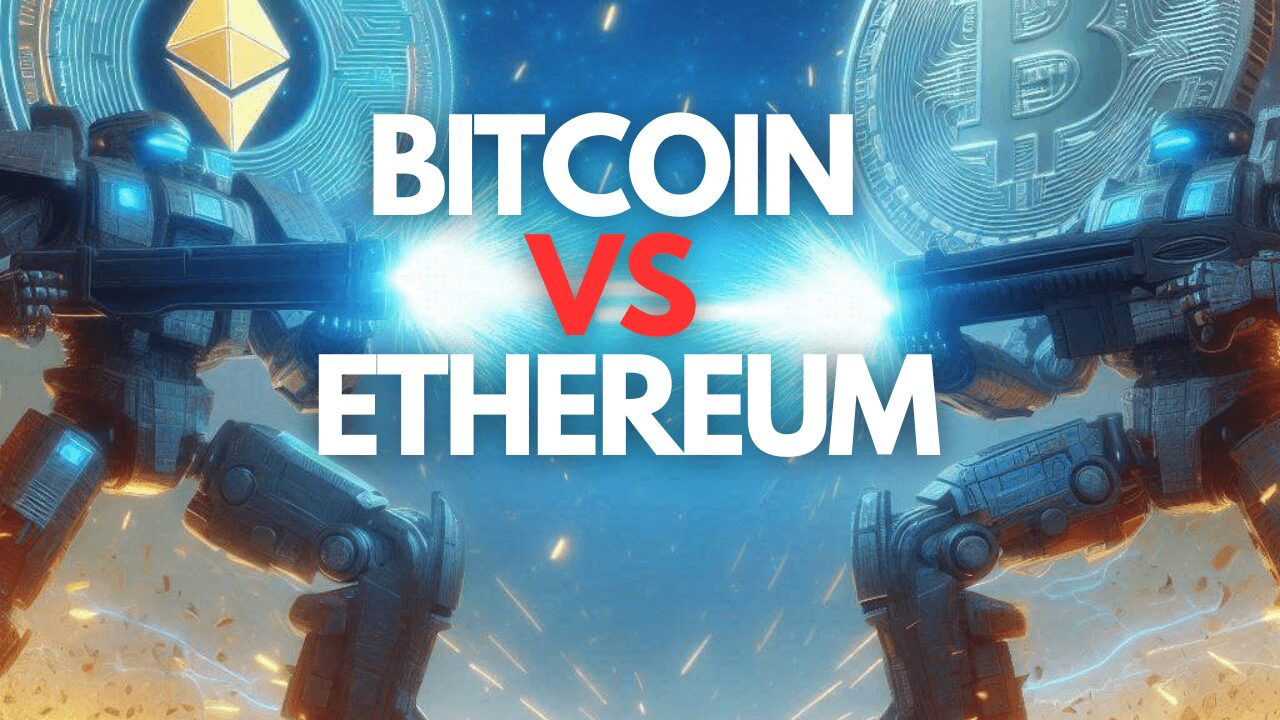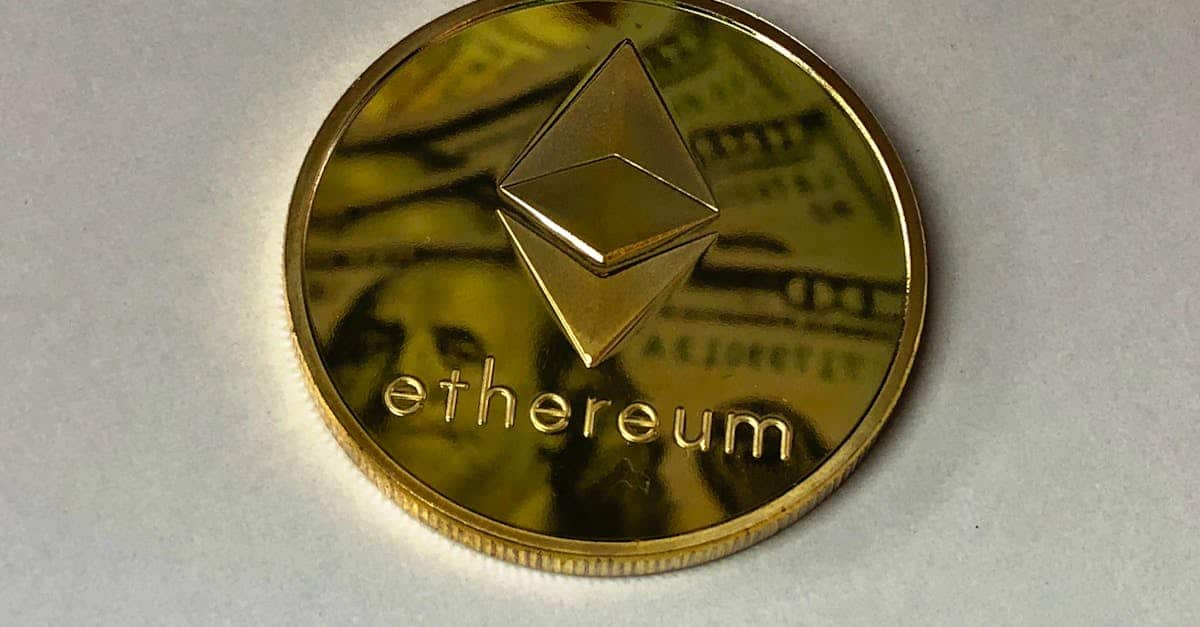When it comes to cryptocurrency, two names dominate the conversation: Bitcoin and Ethereum. But how do these two titans of the digital world actually compare? Are they simply different versions of the same concept, or do they each serve unique purposes within the blockchain universe?
Whether you’re an investor looking to diversify your portfolio or simply curious about the key differences between Bitcoin and Ethereum, understanding these two cryptocurrencies is essential. Bitcoin, often hailed as “digital gold,” set the stage for decentralized digital currency, while Ethereum has revolutionized blockchain technology through smart contracts and decentralized applications (dApps).
In this post, we’ll explore the foundational differences between Ethereum and Bitcoin, analyze their strengths, and delve into their future potential. By the end, you’ll have a clearer understanding of which cryptocurrency aligns with your needs—whether you’re interested in blockchain technology, investment opportunities, or the future of decentralized finance (DeFi).
So, are you ready to unlock the secrets behind these two blockchain giants? Let’s dive in.
What is Bitcoin?
Bitcoin is the original cryptocurrency that set the foundation for the entire digital currency revolution. Created in 2009 by the mysterious figure Satoshi Nakamoto, Bitcoin was designed to offer an alternative to traditional financial systems. But how exactly does Bitcoin work, and why has it captured the attention of so many?
At its core, Bitcoin operates on a decentralized network known as the blockchain. This technology ensures that every transaction is secure, transparent, and immutable—meaning once a transaction is confirmed, it cannot be altered. Unlike traditional currencies that rely on banks or governments to manage transactions, Bitcoin is managed entirely by its community of users, also known as miners.
Key Features of Bitcoin
Here are some of the core features that make Bitcoin stand out:
- Decentralization: No central authority controls Bitcoin. This feature gives users more control over their money without relying on third parties.
- Limited Supply: There will only ever be 21 million Bitcoin in circulation, creating a sense of scarcity and contributing to its value.
- Security: Bitcoin transactions are secured by cryptographic principles, making them resistant to fraud and hacking.
How Bitcoin Works?
Bitcoin’s blockchain is a digital ledger that records every transaction across a network of computers. Each new transaction is added to a “block,” which then joins the chain of previous transactions, hence the term blockchain. Bitcoin mining involves solving complex mathematical puzzles to validate these transactions and keep the network running smoothly.
Use Cases and Adoption of Bitcoin
Bitcoin has evolved from a niche technology into a global financial asset. But what can you actually use it for?
- Digital Payments: Many companies now accept Bitcoin as a payment method, offering an alternative to credit cards and cash.
- Store of Value: Bitcoin is often compared to gold due to its limited supply and increasing demand. Investors see it as a hedge against inflation and currency devaluation.
- Cross-Border Transactions: Bitcoin allows for fast, low-cost transfers across borders, eliminating the need for intermediaries and high fees.
Why Bitcoin Matters in the Digital Economy ?
Bitcoin’s role in the digital economy is undeniable. It’s more than just a cryptocurrency; it’s a movement toward decentralization and financial independence. Whether you view Bitcoin as an investment or a tool for faster, borderless transactions, its impact on the financial landscape is clear.
As Bitcoin continues to evolve, the big question remains: will it maintain its status as the king of cryptocurrencies, or will newer technologies surpass it?
What is Ethereum?
While Bitcoin may have pioneered the cryptocurrency space, Ethereum took it a step further by introducing a revolutionary concept: smart contracts. Created by Vitalik Buterin in 2015, Ethereum wasn’t just built to be digital money—it was designed to be a platform for decentralized applications (dApps), forever changing the landscape of blockchain technology. But what exactly makes Ethereum so different, and why has it become such a powerhouse in the world of crypto?
At its core, Ethereum is also a decentralized platform, but unlike Bitcoin, which focuses on peer-to-peer transactions, Ethereum’s blockchain allows for programmable agreements—smart contracts—that automatically execute when specific conditions are met. This innovation has opened up a world of possibilities, from decentralized finance (DeFi) to the booming world of NFTs (non-fungible tokens).
Key Features of Ethereum
Here are some of the standout features that make Ethereum so versatile:
- Smart Contracts: One of Ethereum’s most groundbreaking contributions. These self-executing contracts allow for decentralized applications to run autonomously without the need for a middleman.
- Ethereum Virtual Machine (EVM): This global computer powers every Ethereum transaction and smart contract, ensuring that all processes on the network are executed as intended.
- Ether (ETH): Ethereum’s native currency, Ether, is used to pay for transaction fees and computational services on the network. Unlike Bitcoin, ETH is not capped, allowing more flexibility for future growth.
How Ethereum’s Blockchain Works ?
Ethereum’s blockchain builds on Bitcoin’s by offering more than just a ledger for transactions. Think of it as a giant computer network where decentralized apps (dApps) run without downtime, censorship, or third-party interference. Here’s how it works:
- Smart Contracts: These are coded agreements that automatically execute when predefined conditions are met. This is key for decentralized applications, enabling everything from DeFi to decentralized exchanges (DEXs).
- Gas Fees: Every time you interact with Ethereum’s network—whether sending ETH or using a dApp—you pay a transaction fee, also known as a gas fee. This fee compensates the network for its computational power.
Popular Use Cases of Ethereum
Ethereum’s flexibility and programmability have made it the go-to platform for developers. Some of the most notable use cases include:
- Decentralized Finance (DeFi): Ethereum is the backbone of DeFi, allowing users to lend, borrow, and earn interest without relying on banks or traditional financial institutions.
- NFTs: The explosion of non-fungible tokens (NFTs) is largely due to Ethereum. From digital art to virtual real estate, NFTs are bought, sold, and traded on the Ethereum blockchain.
- dApps: Thousands of decentralized applications, from gaming platforms to prediction markets, are built on Ethereum, offering users an entirely new way to interact with the internet.
Read More: Explore the Top DeFi Projects to Invest in 2024 /2025
Why Ethereum Is a Game-Changer ?
Ethereum has redefined what blockchain technology can achieve. While Bitcoin is often viewed as a store of value, Ethereum is the foundation for a new digital economy, with smart contracts and decentralized applications leading the charge. Its versatility has attracted developers and innovators across multiple industries, making it one of the most important platforms in the blockchain space.
As Ethereum continues to evolve with its transition to Ethereum 2.0, one of the big questions remains: can Ethereum solve its scalability issues and maintain its dominance as the preferred blockchain for decentralized applications?
Key Differences Between Ethereum and Bitcoin

Now that we’ve covered what Bitcoin and Ethereum are, let’s dive into the key differences that set these two giants apart. While both are built on blockchain technology, their purposes, functionality, and use cases differ significantly. If you’ve ever wondered which one suits your goals, understanding these distinctions is essential.
Technology and Blockchain Structure
At first glance, Bitcoin and Ethereum might seem similar—they both operate on decentralized networks and use blockchain to record transactions. However, their underlying technologies are quite different.
- Bitcoin’s Blockchain: Bitcoin was designed to be a simple, secure digital currency. Its blockchain is relatively limited in functionality—it can only process transactions. This narrow focus makes Bitcoin incredibly reliable but also less flexible than newer platforms.
- Ethereum’s Blockchain: Ethereum took blockchain technology further. While it supports transactions like Bitcoin, its blockchain is programmable, allowing developers to build and deploy decentralized applications (dApps) and smart contracts. Essentially, Ethereum is like a giant, decentralized supercomputer that can run almost anything.
Another key distinction lies in how these blockchains are maintained. Bitcoin still uses the Proof of Work (PoW) consensus mechanism, which requires miners to solve complex puzzles to validate transactions. Ethereum, on the other hand, is transitioning to Proof of Stake (PoS) with Ethereum 2.0, a more energy-efficient method that allows users to validate transactions based on the number of ETH they hold.
Use Cases and Applications
While both cryptocurrencies are widely adopted, Bitcoin and Ethereum serve different purposes within the blockchain ecosystem.
- Bitcoin: Often referred to as digital gold, Bitcoin’s primary use is as a store of value. Many people buy and hold Bitcoin with the belief that it will appreciate over time. Bitcoin is also used as a medium of exchange, especially in cross-border transactions, where it offers a faster and cheaper alternative to traditional methods.
- Ethereum: Ethereum’s functionality extends far beyond being a digital currency. It is the backbone of decentralized finance (DeFi), allowing people to trade, lend, and borrow without intermediaries. The rise of NFTs (non-fungible tokens) has also been powered by Ethereum, where unique digital assets like art and collectibles are bought and sold. Developers have built thousands of decentralized applications on Ethereum, making it a platform for innovation beyond financial services.
Speed, Scalability, and Transaction Costs
One of the most significant practical differences between Bitcoin and Ethereum lies in how they handle transactions. Both networks are often criticized for their scalability issues, but they approach the problem differently.
- Bitcoin’s Speed and Fees: Bitcoin can handle about 7 transactions per second, making it much slower than traditional payment systems like Visa. Transaction fees can also spike during periods of high demand. Solutions like the Lightning Network aim to solve these issues by allowing faster, off-chain transactions.
- Ethereum’s Gas Fees and Scalability: Ethereum is also facing scalability challenges, as its network can become congested, leading to high gas fees—the cost of performing transactions or executing smart contracts. However, Ethereum 2.0 promises to bring significant improvements in scalability by moving to Proof of Stake and introducing sharding, which will allow the network to process more transactions in parallel.
Which One Is Better for You?
So, which is better—Bitcoin or Ethereum? The answer depends on your goals.
- If you’re looking for a store of value or an alternative to traditional currency, Bitcoin might be the better option. Its stability and security make it a reliable choice for long-term investors.
- If you’re more interested in decentralized applications, smart contracts, or participating in the world of NFTs, Ethereum offers far more opportunities. Its versatility makes it the go-to platform for developers and innovators.
Ultimately, both cryptocurrencies have their unique strengths. It’s less about which one is superior and more about which one aligns with your interests and needs. The world of cryptocurrency is vast, and Bitcoin and Ethereum are just the beginning.
Ethereum vs Bitcoin: Investment Perspectives

When it comes to cryptocurrency investments, the debate between Ethereum and Bitcoin is one of the most common. Both are giants in the crypto world, but which one presents a better investment opportunity? If you’ve ever found yourself wondering where to place your bets, understanding the investment potential, risks, and rewards of each can help guide your decision.
Market Capitalization and Value Comparison
Let’s start by looking at the numbers.
- Bitcoin has maintained its position as the largest cryptocurrency by market capitalization since its inception. As the first cryptocurrency, it has gained widespread recognition as digital gold, often used as a hedge against inflation and economic uncertainty. Its limited supply of 21 million coins also contributes to its scarcity, making it highly attractive to long-term investors.
- Ethereum, while second to Bitcoin in terms of market capitalization, has carved out a unique space in the crypto ecosystem due to its versatile technology. Unlike Bitcoin, Ethereum does not have a fixed supply, but its continuous development and use cases—especially in decentralized finance (DeFi) and NFTs—have contributed to its rising value. As a result, many see Ethereum as not just a cryptocurrency, but a platform for innovation and growth.
When comparing value, Bitcoin is often viewed as the safer, more stable asset, while Ethereum represents a higher-risk, higher-reward option, largely due to its evolving infrastructure and future potential.
Price Fluctuations and Volatility Trends
Both Bitcoin and Ethereum have experienced their fair share of volatility. If you’ve followed cryptocurrency for any amount of time, you know how quickly the market can swing.
- Bitcoin’s volatility is often tied to macroeconomic factors like inflation, global financial policies, or geopolitical events. As Bitcoin matures, its price fluctuations tend to stabilize somewhat, but its history of sharp increases and steep drops remains.
- Ethereum’s price, on the other hand, is often driven by network upgrades, the development of decentralized applications, and the rise of NFTs and DeFi projects. Ethereum is still evolving, especially with its transition to Ethereum 2.0, which is aimed at solving scalability issues. This gives Ethereum a lot of upward potential, but also adds uncertainty.
If you’re an investor who prefers a steady, long-term hold, Bitcoin may be the better choice. However, if you’re someone who thrives on market developments and emerging technologies, Ethereum’s volatility might present more opportunities for gains—if you’re willing to ride the waves.
Risks and Rewards of Investing in Bitcoin and Ethereum
No investment comes without risk, and this is particularly true when it comes to cryptocurrencies.
- Bitcoin’s Risks: Despite its dominance, Bitcoin faces certain risks, including regulatory challenges and its heavy reliance on the Proof of Work consensus mechanism, which has been criticized for its environmental impact. Governments around the world are scrutinizing Bitcoin’s role in the financial system, and regulatory changes could affect its price.
- Ethereum’s Risks: Ethereum faces its own set of challenges. While Ethereum 2.0 promises to improve scalability and reduce energy consumption, there’s still some uncertainty around how smoothly the upgrade will go and how it will affect the network. Additionally, Ethereum’s reliance on decentralized applications means that its success is closely tied to the growth of the dApp ecosystem, which itself faces competition from other blockchain platforms.
Despite the risks, both cryptocurrencies offer significant rewards:
- Bitcoin’s Reward Potential: As the first and most well-known cryptocurrency, Bitcoin’s reputation as a store of value remains strong. Many investors see it as a hedge against traditional financial markets, and its limited supply adds to its appeal.
- Ethereum’s Reward Potential: Ethereum’s greatest strength lies in its versatility. With the rapid growth of DeFi, NFTs, and decentralized applications, Ethereum is at the forefront of blockchain innovation. If these sectors continue to expand, Ethereum’s value could rise exponentially.
Introducing #PrimeXBT: Your all-in-one trading platform! 🚀 Trade cryptocurrencies, forex, commodities, and more with ease. Enjoy low fees, fast execution, and a $100 welcome bonus. 💰 #trading #crypto #forex #commodities #onlinetrading #investing https://t.co/6R510BWquC
— Coin Top Secret (@CoinTopSecret1) August 27, 2024
Long-Term Growth Potential for Investors
When it comes to long-term growth, both Bitcoin and Ethereum offer exciting possibilities.
- Bitcoin: Its fixed supply and increasing global adoption suggest that Bitcoin’s value could continue to rise over time. Many institutional investors are now adding Bitcoin to their portfolios, signaling increased confidence in its long-term potential.
- Ethereum: With Ethereum 2.0 on the horizon, the network’s scalability and energy efficiency are set to improve dramatically. As Ethereum continues to support decentralized applications and new blockchain technologies, its long-term growth potential is enormous, especially for those who believe in the future of decentralized finance and smart contracts.
In the end, the choice between investing in Bitcoin or Ethereum depends on your goals. Are you looking for a safe store of value that could act as a hedge against traditional financial markets? Bitcoin might be your answer. Are you excited by the innovation happening in the blockchain space and want to invest in the platform driving decentralized applications? Then Ethereum could be the better option for you.
Both assets have their unique strengths, and many savvy investors choose to diversify by holding both in their portfolios, balancing stability with growth potential.
The Future of Ethereum and Bitcoin: What’s Next?
As we look to the future of Ethereum and Bitcoin, it’s clear that both cryptocurrencies are shaping the digital economy in profound ways. But what lies ahead? Will one ultimately dominate the market, or do they serve different enough purposes to thrive side by side? If you’re wondering how these two blockchain giants will evolve, you’re not alone.
The Evolution of Bitcoin: Can It Remain King?
Bitcoin’s future is often debated, especially as new cryptocurrencies and blockchain technologies emerge. Yet, Bitcoin’s position as the first and most trusted cryptocurrency gives it a significant edge. It’s seen by many as a reliable store of value, much like gold, and its fixed supply ensures scarcity. But is that enough?
Bitcoin’s ability to adapt will likely determine its staying power. While it continues to be a preferred asset for investors looking for security, Bitcoin is also exploring scaling solutions such as the Lightning Network, which aims to increase transaction speeds and reduce costs. However, concerns about energy consumption and regulatory crackdowns could challenge its path forward.
- Key challenges for Bitcoin:
- Addressing environmental concerns related to Proof of Work (PoW).
- Balancing its role as both a digital currency and store of value.
- Competing with more technologically advanced blockchains that offer greater flexibility.
Ethereum’s Roadmap: Ethereum 2.0 and Beyond
Ethereum’s future is arguably even more exciting due to its ambitious roadmap. With the upgrade to Ethereum 2.0, the network is moving toward Proof of Stake (PoS), which promises to solve many of Ethereum’s current limitations, including scalability and energy efficiency.
Ethereum is positioning itself as the foundation for a new decentralized internet—Web3. Its ability to support decentralized applications (dApps), decentralized finance (DeFi), and NFTs places it at the center of blockchain innovation. Ethereum 2.0’s introduction of sharding—a technology that divides the network into smaller, more manageable pieces—will allow for far greater transaction speeds and lower gas fees.
- Exciting developments to watch for Ethereum:
- Ethereum 2.0 and its transition to Proof of Stake, reducing energy consumption by 99%.
- Increased adoption of decentralized finance (DeFi) and NFTs, where Ethereum is the dominant platform.
- Potential integration into real-world financial systems, bridging traditional finance with decentralized networks.
Competing with Emerging Cryptocurrencies and Blockchain Technologies
Both Bitcoin and Ethereum face growing competition. Newer blockchains like Solana and Cardano have been gaining traction due to their speed, scalability, and lower costs. These blockchains promise to offer what Bitcoin and Ethereum currently lack, such as faster transactions and more energy-efficient consensus mechanisms.
So, what does this mean for the future of Bitcoin and Ethereum? It’s not necessarily a zero-sum game. Instead of one winning out over the other, Bitcoin and Ethereum may continue to coexist, each fulfilling different roles:
- Bitcoin: As a secure, decentralized store of value with wide adoption and trust, Bitcoin will likely continue to dominate as “digital gold.”
- Ethereum: With its ever-growing ecosystem of dApps, smart contracts, and DeFi, Ethereum has positioned itself as the primary blockchain for innovation.
Both have the potential to evolve alongside new competitors, adapting to market demands and user needs.
How Should Investors Prepare for the Future?
For investors, understanding the potential of both Ethereum and Bitcoin is key to making informed decisions. If you’re thinking long term, both offer unique opportunities based on your investment strategy:
- Bitcoin: A more conservative investment that offers stability and security as a store of value.
- Ethereum: A higher-risk, higher-reward investment, driven by technological advancements and its role in decentralized applications.
Investors may also want to keep an eye on newer blockchain platforms, as the rapidly changing landscape of cryptocurrency presents both risks and opportunities.
The Final Verdict: Can They Coexist?
In a world of constant innovation, it’s tempting to think one cryptocurrency will ultimately come out on top. But in reality, Bitcoin and Ethereum each have distinct roles to play in the evolving blockchain ecosystem.
Bitcoin continues to be the preferred choice for those seeking stability and a hedge against inflation, while Ethereum offers far more potential for developers, innovators, and investors looking to tap into the expanding world of decentralized finance and Web3 applications.
In the future, the blockchain world may not be defined by a single cryptocurrency but rather a dynamic, evolving ecosystem where both Bitcoin and Ethereum—and perhaps other platforms—thrive together, each serving different needs and use cases.
As the landscape changes, one thing remains clear: the future of cryptocurrency is bright, and both Bitcoin and Ethereum will continue to shape it. Are you ready to be a part of it?
Conclusion: Bitcoin vs Ethereum – Which Path Will You Take?
At this point, you’ve explored the key differences between Bitcoin and Ethereum, their underlying technologies, and the unique opportunities they present. So, which one resonates more with your goals?
If you’re drawn to the idea of a stable, secure store of value with the potential to act as a hedge against inflation, Bitcoin may be your ideal choice. On the other hand, if the promise of decentralized applications, smart contracts, and the future of Web3 sparks your curiosity, Ethereum’s ever-evolving ecosystem could be a better fit.
But here’s the thing—this doesn’t have to be an “either-or” decision. In fact, many savvy investors and enthusiasts choose to hold both assets, leveraging Bitcoin’s long-term stability while capitalizing on Ethereum’s innovation and potential for growth. The beauty of the cryptocurrency space is that it’s dynamic, and there’s room for multiple platforms to thrive.
As the blockchain landscape continues to develop, the roles of Bitcoin and Ethereum may evolve, but one thing is certain: both will remain key players in the future of decentralized finance and digital economies. Whether you’re a cautious investor or an innovator ready to explore new horizons, there’s a place for you in this revolution.
So, which path will you take? Bitcoin’s digital gold standard, or Ethereum’s platform for the future? The decision is in your hands, and either way, the journey is bound to be exciting.
Read More: Your Complete Crypto Tax Guide for 2024 / 2025



